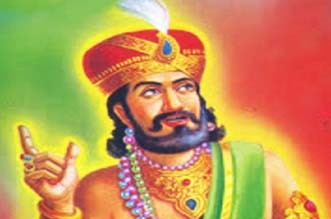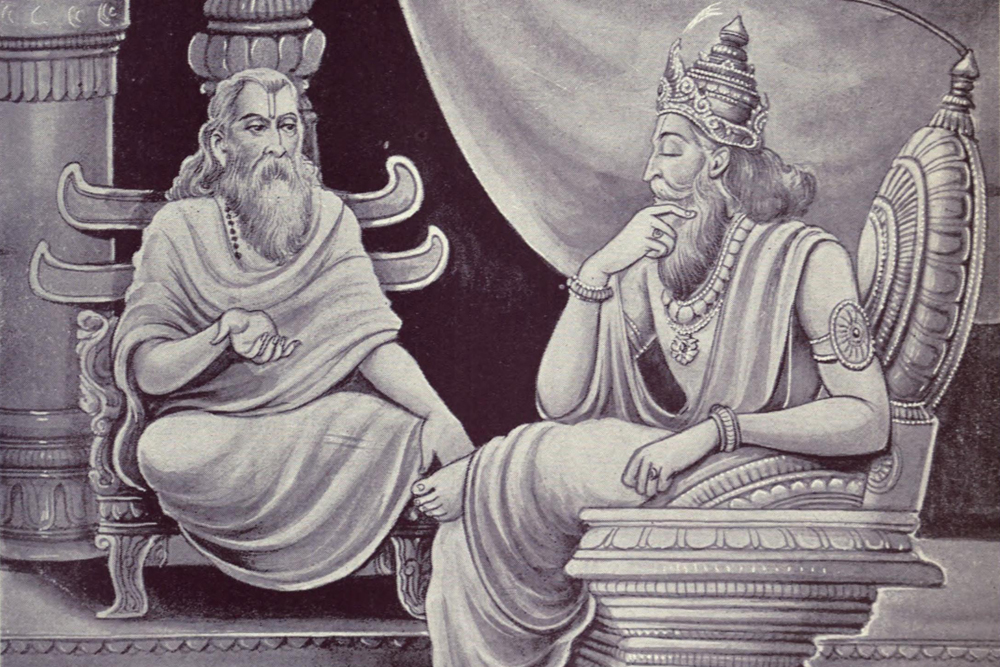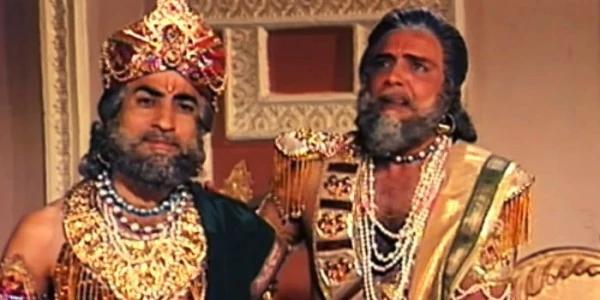The Mahabharata is filled with characters who represent different facets of human nature—strength, ambition, righteousness, and deceit. Among them, one figure stands out as the embodiment of wisdom and dharma: Vidura. Unlike the warriors of his time, Vidura did not wield weapons, yet his words were sharper than any sword. He was the conscience of the Kuru dynasty, a voice of reason in a court often swayed by power and greed.
Vidura’s life is a testament to the idea that wisdom and righteousness hold greater power than wealth and lineage. Despite being born into a lower caste, his intellect and unwavering commitment to truth made him the chief advisor to Hastinapura. However, his life was also marked by sorrow, as he often found himself ignored in moments when his wisdom was most needed. In this post, we explore the life, teachings, and legacy of Vidura, a man whose wisdom remains relevant even today.
1. Who Was Vidura?
Vidura was born under unusual circumstances. He was the son of the sage Vyasa and a maidservant, making him the half-brother of Dhritarashtra and Pandu. According to legends, Vidura was an incarnation of Dharma, cursed to be born as a human due to an earlier divine conflict. This celestial origin gave him unparalleled wisdom and a deep sense of justice.
Despite his wisdom, Vidura faced societal discrimination. Unlike his brothers, he was denied the throne of Hastinapura because he was not of royal birth. However, his intellect and righteousness earned him a position as the chief advisor in the Kuru court. Vidura was raised alongside Dhritarashtra and Pandu, but unlike them, he was neither power-hungry nor driven by personal ambition. Instead, his only allegiance was to dharma.

2. Vidura’s Role in the Kuru Court
Vidura played a crucial role in the governance of Hastinapura. As an advisor, his duty was to ensure that decisions were made based on justice and dharma. However, his wisdom often went unheeded, especially by King Dhritarashtra, who was blinded by his love for his son, Duryodhana.
Vidura consistently opposed the injustices in the kingdom. When Duryodhana sought to eliminate the Pandavas, it was Vidura who warned them of the conspiracy. He also strongly objected to Shakuni’s manipulative influence and repeatedly advised Dhritarashtra to control his son’s reckless behavior. However, despite his best efforts, his words often fell on deaf ears.
Vidura’s integrity made him unpopular among those who sought power. Duryodhana, in particular, despised him for speaking the truth. Yet, Vidura never wavered in his commitment to righteousness, even when it meant standing alone against the tide of corruption.
3. Vidura and the Pandavas – His Secret Support
Vidura was one of the few in the Kuru court who genuinely cared for the well-being of the Pandavas. When Duryodhana and Shakuni plotted to burn them alive in the Lakshagraha (House of Lac), it was Vidura who secretly warned them and provided them with an escape plan.
Throughout their exile, Vidura remained their silent supporter, ensuring they had the necessary guidance to navigate their challenges. He recognized Yudhishthira as the rightful heir to the throne and hoped that dharma would eventually prevail in Hastinapura.
4. The Game of Dice – Vidura’s Warnings and Helplessness
The infamous game of dice was one of the darkest moments in the Mahabharata. Vidura foresaw the catastrophe that would unfold and vehemently opposed it. He warned Dhritarashtra against allowing the game, emphasizing that it would lead to destruction.
When Draupadi was humiliated in the court, Vidura was one of the few who protested against the injustice. He boldly spoke against Duryodhana and his allies, calling their actions disgraceful. However, his words were ignored, and he was even insulted by Duryodhana, who called him a “son of a servant.” Despite the insult, Vidura remained steadfast in his principles, refusing to bow to tyranny.
5. Vidura’s Ethics and Spiritual Wisdom – The Vidura Neeti
One of Vidura’s greatest contributions to Hindu philosophy is the Vidura Neeti, a collection of teachings on governance, morality, and dharma. In these teachings, Vidura advises Dhritarashtra on how a king should rule justly and the consequences of ignoring righteousness.
Some key lessons from Vidura Neeti include:
- The importance of self-restraint: A wise person controls their desires and acts with balance.
- The power of truth: A kingdom built on falsehood is bound to collapse.
- The dangers of bad company: One should avoid associating with the wicked, as they bring destruction.
- The role of karma: Every action has consequences, and dharma will always prevail in the end.
These teachings are timeless and remain relevant for modern leadership, ethics, and personal development.
6. Vidura’s Exile and His Final Journey
After years of being ignored and insulted, Vidura finally left Hastinapura when Duryodhana openly disrespected him in court. He renounced his position and chose the path of spiritual asceticism, realizing that the kingdom was doomed due to its moral corruption.
Vidura spent the final years of his life as a wandering sage, detached from worldly affairs. His journey symbolizes the ultimate realization that wisdom and righteousness often go unrecognized in a world driven by greed. However, his soul found liberation through detachment and self-realization.

7. The Spiritual Legacy of Vidura
Vidura is often regarded as the moral compass of the Mahabharata. His unwavering commitment to dharma, despite being surrounded by corruption, makes him an ideal role model for truth and integrity.
His life teaches us:
- To stand by what is right, even when alone.
- That wisdom is greater than wealth or power.
- That detachment from material desires leads to true freedom.
Even today, Vidura’s wisdom is studied in Hindu philosophy, and his teachings serve as a guide for ethical leadership and spiritual growth.
Vidura’s life in the Mahabharata is a reminder that wisdom and morality often come at a great personal cost. He was a man who stood for truth in a world of deception, yet he was constantly overlooked and insulted. However, his legacy endures because dharma always triumphs in the end.
In our modern lives, we face countless ethical dilemmas, just like Vidura did. His story teaches us that even if the world refuses to listen, standing by what is right is the highest form of dharma. Vidura remains an eternal symbol of righteousness, inspiring generations to choose wisdom over power and truth over convenience.

